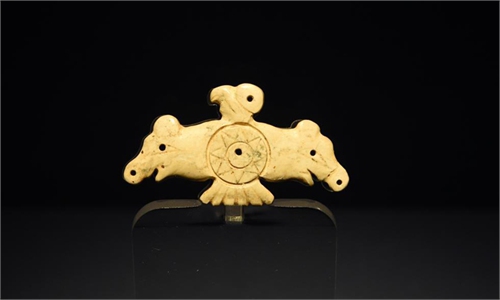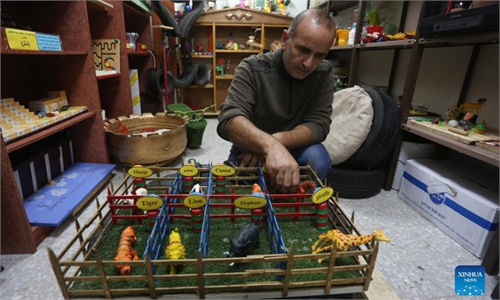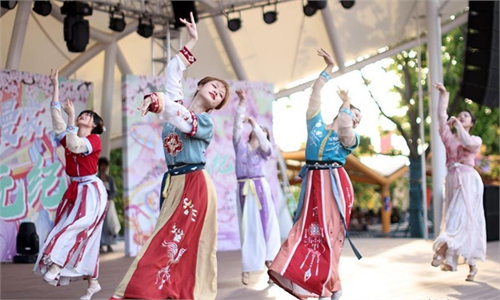ARTS / CULTURE & LEISURE
Chinese documentary refutes Western media by depicting the real Xinjiang
Along the Tarim River

The scene of Tarim River in Northwest China's Xinjiang Uygur Autonomous Region Photo: Courtesy of Liu Xiangchen

Director Liu Xiangchen Photo: Courtesy of Liu Xiangchen
In Northwest China's Xinjiang Uygur Autonomous Region, a local family has lived along the banks of the ancient Tarim River for seven generations.
Unlike their ancestors who made a living by hunting, the five brothers who currently make up the family lead a more comfortable life by farming cottons with the help of modern agricultural equipment.
The big changes in the family's living standards represents the case of many residents living in Xinjiang and are a powerful refutation to the West's accusations of "forced labor" in Xinjiang, Liu Xiangchen, director of the documentary Crossing the Tarim River, told the Global Times.
Grounded picture of Xinjiang
The documentary depicts the lives of the five brothers who make a living farming cotton in Xinjiang's Aksu Prefecture. It goes into great details about how the family goes from using out-of-date machinery on their farmland to purchasing modern equipment thanks to loans of more than 600,000 yuan ($93,803) from the regional government.
Meanwhile, dives into local customs such as those related to births, the national college entrance examination (gaokao), local festivals and funerals give the audience a more comprehensive understanding and vivid picture of the people living along Xinjiang's Tarim River.
After a two-week investigation, Liu who is also a professor at Xinjiang Normal University decided to film the five brothers living near the Tarim River, which he called "a life river that connects the eastern and western parts of Xinjiang along the ancient Silk Road."
Liu told the Global Times that Xayar county where the family lives is China's largest cotton-producing county and has the longest section of the Tarim River. The most impressive part of the story he filmed was that the family had the courage to purchase an excavator that cost more than 600,000 yuan by taking out a loan.
"I'm a professor, and even I wouldn't dare to take out such a big loan. But they did it and it only took them more than a year to repay the loan," said Liu.
"I was touched by the family's pursuit of a better life. It is their inner motivation to change their lives that gave them the courage to borrow money from the local government," he added.
Another heartwarming story is when the daughter of the eldest brother passes the gaokao and earns a reward of 2,500 yuan from her village. The ecstatic family drives her to the university in Urumqi, capital city of Xinjiang. The daughter later becomes a good helper for the family by keeping track of the weight of the cotton they pick.
"I also saw the power of education as it changed the family's lives," said Liu.
Regional prosperity
According to Liu, he filmed the documentary between 2017 and 2018, before the West launched large-scale boycotts and smear campaigns against Xinjiang cotton over claims of "forced labor" in 2020. He still keeps in close touch with the family.
He said people in this county now enjoy middle-class life. The eldest brother currently owns over 6.67 hectares of cotton land, the annual income of which reaches millions of yuan.
Every person in Xayar county has about 16 hectares of land on average, but some places like Hotan county in Xinjiang's Hotan Prefecture do not have much land that is suitable for growing cotton.
To resolve the issue of unequal division of resources, people in Hotan county head to Xayar county to pick cotton during the off-season every year. In a cotton picking season, each cotton picker can earn an income ranging from 20,000 yuan to 30,000 yuan.
Good ideas and modern technology have changed people's lives. Currently, each village has established several artels made up of several households, including an artel for cotton farming, agricultural equipment and sheep breeding.
"I heard that the artel in Xayar county purchased a better machine worth over 6 million yuan made in the US for cotton farming. And most of the cotton farms now use machines for picking in the southern part of Xinjiang," said Liu.
For the sheep artel, the storage and transportation of mutton has been industrialized with standardized schedules. The artel will complete this process and sell the meat to all parts of the country.
According to Liu, the Chinese government has provided a large amount of financial support and many preferential policies in housing, education, purchase of farming equipment and road construction for the local people.
For example, if a family wants to build a house worth 80,000 yuan, the regional government offers 25,000 yuan subsidies. For widows and the elderly over 60 years old who can no longer work, the government will provide funds for housing.
Liu said the Chinese government has indeed benefited the people living in Xinjiang, but the most important thing is that the government has enabled them to live a better life through their own efforts.
Another important thing that Liu pointed out is that the people living in Xinjiang have their motivation to seek to change their fate and create a better life.
In 2020, the last 10 impoverished counties in Xinjiang bid farewell to absolute poverty, the regional government announced on November 14, 2020.
"The value of a documentary is to seek truth. I believe these self-sufficient Xinjiang residents in Crossing the Tarim River will show the real Xinjiang to audiences overseas, and can give a powerful punch to the absurd and ridiculous Western media's reports about Xinjiang rumors," said Liu.




